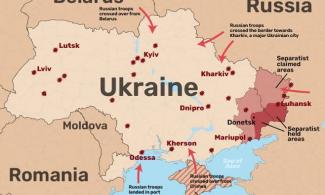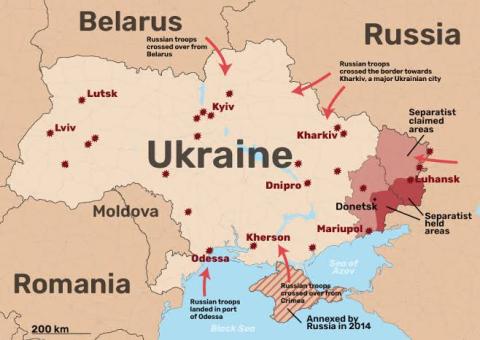
All 170 universities are currently on strike in Nigeria and Chukwuemeka asked: “Why would anyone want to go back to Nigeria?”
“There is nothing in Nigeria to go back to,” Chukwuemeka Nnamdi, a Nigerian student studying in Ukraine tells SaharaReporters.
Since Russian soldiers crossed the Ukraine border on February 24th, about 1,842 civilians have been killed and 2,493 people have been injured. Ukrainian cities like Donetsk, Luhansk. and Mariupol are currently under Russian control and citizens all over the country are making plans to escape.

Amid this invasion and multiple bombings, countries like India, Morocco, China and Nigeria have evacuated their citizens, especially students studying in Ukraine. According to Ukraine’s Ministry of Education and Science, about 80,000 international students were studying in Ukraine before the war and Nigerians made up 12,000 of them.
As early as 24th February, the day the invasion began, the Nigerian government started making plans to evacuate Nigerians from Ukraine. With help from its embassy in Warwick, Nigerian citizens were directed via press releases to escape through Poland, where arrangements had been made to return them to Nigeria… but many refused.
The government had approved 8.5 million dollars to evacuate her citizens on 2nd March and even waved pre-departure COVID-19 tests for them, yet some Nigerian students, including Nnamdi Okafor, Treasure Bellgam and Edidiong Ukpakha have made headlines for refusing to return to their home country. One even went as far as telling reporters “What am I coming back to Nigeria to do?... I would rather remain here as a refugee than return to Nigeria.”
The Question Is Why?
In an exclusive interview with Chukwuemeka Nnamdi, a Nigerian second-year clinical intern at the Sumy State University in Ukraine, he said, “This is a touchy situation, truthfully there’s nothing in Nigeria to go back to. The situation back home is appalling. It’s one bad news after another. No steady power supply, there is insecurity and there is no ideal working system.
“I was able to leave for Hungary two weeks after the attack began and there was panic everywhere. It was a very stressful time for me, especially when we had to go into the bunkers… yet I never had plans of going back to Nigeria.
“Nigeria experiences the same situation as Ukraine daily. But in Europe, there’s hope. Some of us have gotten jobs, and some have been transferred to schools here. See how fast that is?” he asked. “Professors in Nigeria are still on strike and university students like myself are doing nothing at home.”
Indeed Nigerian lecturers under their umbrella union, the Academic Staff Union of Universities (ASUU) had been on strike before the war began. The Association claims that the Nigerian Government has failed to uphold its part of their 2009 agreement to provide better salaries and allowances for University lecturers and that they will not resume teaching until these conditions are met.
The strike was extended by two months after ASUU failed to reach an agreement with the government during the initially one-month strike, which expired on March 14. ASUU has insisted on receiving 1 Trillion naira (2,388,600,000 USD) from the Nigerian government but the government has said there is no money to give.
The Minister of Labour, Chris Ngige told pressmen on March 3rd that the government made those promises during a different administration and Nigeria isn’t as rich as it was before. Oil was sold between $100 and $120 per barrel during the Goodluck Jonathan Administration, "but things are not as good now."
All 170 universities are currently on strike in Nigeria and Chukwuemeka asked: “Why would anyone want to go back to Nigeria?”
One Nigerian lecturer from the Federal University Oye-Ekiti shared his sentiments. Dr. Oluwaseun Osadola, a senior lecturer at the Department of History and International Studies, laughed and said, “If a lot of people get the opportunity to travel outside of this country, trust me they will never want to come back. I read in the dailies when one of the Nigerian students in Ukraine said he would rather die in Ukraine than come back to Nigeria and face hardship.”
“Look at me,” he said. “My one month's salary isn’t enough to pay my house rent and I have a PhD in history and international studies. Everything is messed up and those students abroad know it... It’s like moving from fry pan to fire.”
Some Nigerians in the country have volunteered to fight for Ukraine – many of them, especially those who have no combat experience whatsoever, in desperate attempts to leave their country.
Twenty-seven-year-old Nigerian, Ottah Abraham, told reporters on 16th March, “We know that it’s war, it’s not child’s play…But being a soldier in Ukraine would be better than being here.”
As of May 2020, almost 83 million people lived below the country’s poverty line of 137,430 naira ($381.75) per year in Nigeria. According to a recent World Bank report, that number has climbed with only 17% of working Nigerians earning enough to lift them out of poverty in a country of about 250 million people.
And when the Ukrainian embassy in Nigeria asked these volunteers to pay $1,000 each for tickets and visas to Ukraine, prove evidence of military experience and provide passports among other things, the number was reduced. Some Nigerians took to grumbling on Twitter. One said, “the Ukrainian embassy’s demand is absurd and unbelievable and thinks that the embassy is sabotaging the President of Ukraine’s effort”.
Another tweeted, “To fight what exactly? The only time you are allowed to enter a country is when they want you to fight their war….like pay money to die….no one told us death is expensive.” Hundreds of Nigerian refugees have returned so far, but many have refused to go back even though the situation in Ukraine is dire.
What It Is Really Like In Ukraine
Early this April, SaharaReporters spoke with Stephen Atolagbe, a first-year Nigerian medical student studying at Sumy State University. He is one of those lucky enough to escape the war and he describes it as "terrible".
"Until I left, we woke up to the sound of Russian missiles every morning. When the alarms would go off, we would run to bomb shelters as soon as we got the signal... Some of the bomb attacks shook our dormitory buildings at Sumy State University," he said.
"It happened suddenly and I couldn't let my family know how I was. One of the days my friends and I were trying to leave the city, we heard a Russian missile close by and we had to run. We didn't know where it was coming from or going to until after.
"For three days, we didn't have access to water or power supply. It never happened before. I couldn't plug my phone to call my parents in our part of the city anymore so we had to leave. We made our way to Hungary.
"I have lived in Ukraine for over a year now and I know the Ukrainians are strong people. It may take some time, but they will win. I will return to Ukraine."